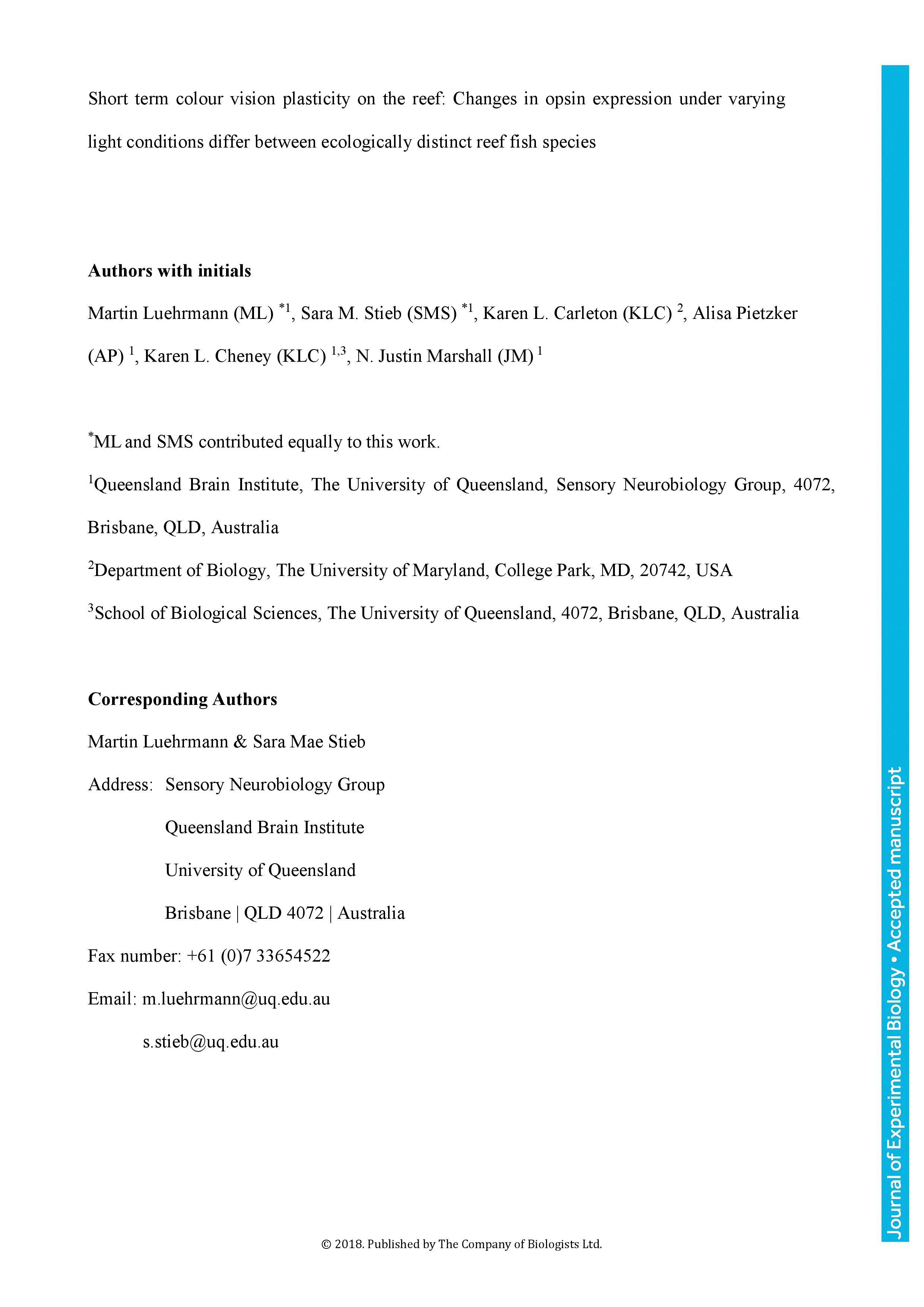Vision mediates important behavioural tasks such as mate choice, escape from predators and foraging. In fish, photoreceptors are generally tuned to specific visual tasks and/or to their light environment according to depth or water colour to ensure optimal performance. Evolutionary mechanisms acting on opsin genes, the protein component of the photopigment, can influence the spectral sensitivity of photoreceptors. Opsin genes are known to respond to environmental conditions on a number of time scales including shorter time frames due to seasonal variation, or through longer term evolutionary tuning. There is also evidence for ‘on-the-fly’ adaptations in adult fish in response to rapidly changing environmental conditions, however, results are contradictory. Here we investigated the ability of three reef fish species that belong to two ecologically distinct families, Yellow-striped cardinalfish, Ostorhinchus cyanosoma, Ambon damselfish, Pomacentrus amboinensis, and Lemon damselfish, Pomacentrus moluccensis, to alter opsin-gene expression as an adaptation to short-term (weeks to months) changes of environmental light conditions, and attempted to characterize the underlying expression regulation principles. We report the ability for all species to alter opsin gene expression within months and even a few weeks, suggesting that opsin expression in adult reef fish is not static. Furthermore, we found that opsin expression changes in single cones generally occurred more rapidly than in double cones, and identified different responses of RH2 opsin gene expression between the ecologically distinct reef fish families. Quantum catch correlation analysis suggested different regulation mechanisms for opsin expression dependent on gene class.
Short term colour vision plasticity on the reef: Changes in opsin expression under varying light conditions differ between ecologically distinct reef fish species
ML and SMS contributed equally to this work.
Currently Viewing Accepted Manuscript - Newer Version Available
Martin Luehrmann, Sara M. Stieb, Karen L. Carleton, Alisa Pietzker, Karen L. Cheney, N. Justin Marshall; Short term colour vision plasticity on the reef: Changes in opsin expression under varying light conditions differ between ecologically distinct reef fish species. J Exp Biol 2018; jeb.175281. doi: https://doi.org/10.1242/jeb.175281
Download citation file:
Advertisement
2023 JEB Outstanding Paper Prize shortlist and winner

The JEB Editors are delighted to announce the shortlisted authors for the 2023 JEB Outstanding Paper Prize. Read the winning paper - Tiny spies: mosquito antennae are sensitive sensors for eavesdropping on frog calls - by Hoover Pantoja-Sanchez and Brian Leavell from Ximena Bernal's lab at Purdue University, USA.
JEB Science Communication Workshop for ECRs

If you’re an early-career researcher interested in science communication and are attending the SEB Annual Conference in Prague this summer, come a day early and join the JEB Editors at a sci comm workshop to learn the key writing skills needed to promote your research to a broad audience beyond your peers (1 July at 14.30-17.30). Places are limited to 24 attendees, and applicants should apply through the SEB registration page by 30 April 2024.
Bridging the gap between controlled conditions and natural habitats in understanding behaviour

Novel technologies enable behavioural experiments with non-model species, in naturalistic habitats and with underexplored behaviours. In their Commentary, Scholz and colleagues discuss how to obtain a deeper understanding of the natural ecology and lifestyle of study animals.
Beluga metabolic measures could help save species

To help save animals from extinction, it’s important to understand what each species needs to survive. This led Jason John et al. to measure the metabolic rates of captive belugas to develop a ‘fish calculator’ showing that the whales need to eat ~23 salmon per day.
ECR Workshop on Positive Peer Review

Are you an ECR looking for tips on how to write concise, astute and useful manuscript reviews? If so, join the JEB Editors at a 2-hour JEB-sponsored Workshop on Positive Peer Review at the Canadian Society of Zoologists annual meeting in Moncton on 9 May 2024 at 13.00-15.00. There are 25 spaces for ECRs and selection is first come, first serve. To sign up, check the ECR Workshop box when you register for the CSZ meeting.



